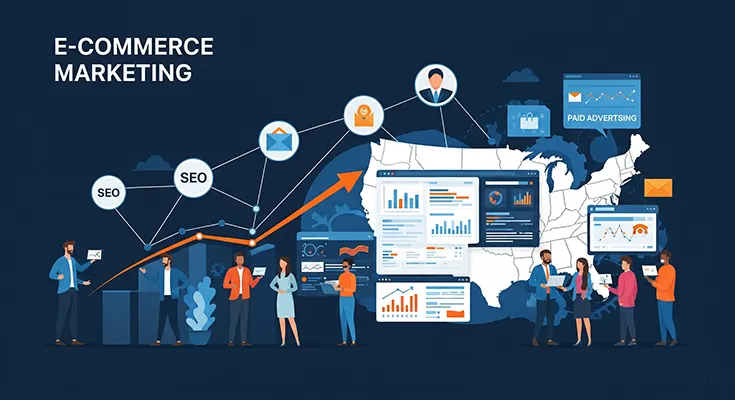As the e-commerce industry continues to surge in the United States, the demand for digital marketing services tailored to online businesses has never been higher. Scaling an e-commerce focused digital marketing business in the US requires a strategic approach that encompasses leveraging the latest trends, understanding the evolving needs of e-commerce clients, and expanding your service offerings to meet the demands of the market. Here are key strategies to consider when scaling your e-commerce focused digital marketing business in the US.
1. Embrace Omnichannel Marketing
In the rapidly evolving e-commerce landscape, an omnichannel marketing approach is essential to engage consumers across various touchpoints. From social media platforms and search engines to email marketing and mobile apps, an effective omnichannel strategy ensures a cohesive and personalized experience for e-commerce clients’ target audiences. Expanding your digital marketing services to cover a wide array of channels enables you to cater to the diverse needs of e-commerce businesses and drive impactful results.
2. Leverage Data-Driven Marketing Techniques
The US e-commerce market thrives on data-driven decision-making, and digital marketing strategies need to follow suit. Implement advanced analytics, customer segmentation, and performance tracking to refine your e-commerce-focused marketing campaigns continually. Utilize consumer data to personalize marketing messages, optimize ad targeting, and deliver measurable ROI for your clients’ online stores.
3. Offer Specialized E-commerce SEO and Content Marketing Services
E-commerce websites heavily rely on search engine visibility to drive traffic and conversions. As you scale your digital marketing business, consider offering specialized SEO and content marketing services tailored to e-commerce platforms. This includes optimizing product pages, conducting keyword research for product listings, and creating engaging, conversion-focused content that aligns with your clients’ brand and products.
4. Provide Advanced E-commerce Advertising Solutions
Stay ahead of the competition by offering advanced advertising solutions specifically designed for e-commerce clients. This may include dynamic product ads, remarketing strategies, and leveraging platforms such as Google Shopping and social media ad platforms to drive sales and enhance brand visibility for e-commerce businesses. Additionally, explore opportunities in programmatic advertising and native advertising to further diversify your service offerings.
5. Enhance User Experience and Conversion Rate Optimization (CRO)
Help e-commerce businesses improve user experience and conversion rates through CRO-focused digital marketing services. Offer expertise in A/B testing, website optimization, mobile responsiveness, and streamlined checkout processes to maximize the revenue potential for your e-commerce clients. Providing comprehensive CRO services can position your digital marketing business as a valuable partner for e-commerce entrepreneurs looking to boost their online sales performance.
6. Leverage Influencer Marketing for E-commerce Brands
Influencer marketing has emerged as a powerful tool for e-commerce businesses to reach their target audience authentically. As part of your scaled services, consider incorporating influencer marketing strategies to amplify brand awareness, drive product endorsements, and boost sales for your e-commerce clients. Cultivate relationships with relevant influencers within the e-commerce space to offer impactful collaboration opportunities.
7. Invest in Automation and AI Tools
Scaling an e-commerce focused digital marketing business requires leveraging automation and AI tools to streamline processes, enhance targeting capabilities, and improve overall efficiency. Implement marketing automation platforms, AI-based customer segmentation tools, and machine learning algorithms to deliver personalized, data-driven marketing solutions at scale for your e-commerce clients.
8. Expand into E-commerce Analytics and Reporting
In addition to marketing services, consider expanding into e-commerce analytics and reporting to provide your clients with actionable insights into their online store performance. Develop custom dashboards, conversion attribution models, and performance reports that highlight the impact of your marketing efforts on e-commerce sales, customer acquisition costs, and overall business growth.
Scaling an e-commerce focused digital marketing business in the US requires a proactive approach that adapts to the evolving needs of online businesses. By embracing omnichannel strategies, offering specialized SEO, content marketing, and advertising services, and investing in advanced tools and technologies, you can position your digital marketing business as a valuable partner for e-commerce entrepreneurs seeking to thrive in the competitive US online retail market.
Remember, staying informed about e-commerce trends, consumer behavior, and emerging technologies is crucial for continuously refining and expanding your services to meet the dynamic demands of the e-commerce industry in the US.





